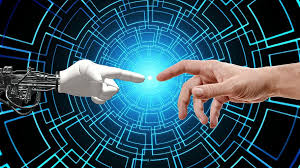Artificial Intelligence
Artificial Intelligence (AI) is rapidly reshaping the landscape of numerous industries, ushering in transformative changes that promise increased efficiency, innovation, and customer satisfaction. From healthcare and finance to manufacturing and entertainment, AI is poised to revolutionize the way businesses operate, make decisions, and deliver value. In this exploration, we delve into the multifaceted impacts of AI on various sectors and the opportunities and challenges it presents.

http://Big companies use AI-generated ads because they’re cheap
Healthcare:
AI is poised to revolutionize healthcare by enhancing diagnostics, personalized treatment, and drug discovery. Machine learning algorithms can analyze medical images and data to aid in early disease detection, while predictive analytics can identify patient deterioration trends. Personalized treatment plans can be created by analyzing patient data and medical literature. Drug discovery processes can be accelerated through AI-driven analysis of massive datasets, identifying potential drug candidates faster than traditional methods.
Finance:
The financial industry stands to benefit from AI’s data analysis capabilities. Algorithms can predict market trends, optimize investment portfolios, and detect potential fraud. Customer service is being transformed by AI-powered chatbots that provide instant assistance and personalized recommendations. Risk assessment and credit scoring can be improved through advanced data analysis, enabling more accurate lending decisions. Trading algorithms execute high-frequency trades based on real-time market insights.
Manufacturing:
AI-driven automation is revolutionizing manufacturing by optimizing production processes and quality control. Robots and machines equipped with AI can handle tasks ranging from assembly and packing to complex production processes. Predictive maintenance can prevent costly downtimes by identifying potential equipment issues before they occur. Supply chain management can be enhanced through AI-driven demand forecasting, reducing waste and optimizing inventory levels.
Retail:
AI is redefining the retail experience through personalized shopping recommendations, improving customer engagement and loyalty. Retailers can analyze consumer behavior to optimize store layouts and product placements. Inventory management is becoming more efficient through real-time demand forecasting, reducing overstock and understock situations. In-store robots can assist with tasks such as restocking shelves and guiding customers.
Transportation:
Self-driving vehicles powered by AI are on the cusp of transforming transportation. Autonomous cars and trucks can enhance road safety, reduce congestion, and revolutionize the logistics industry. AI-powered algorithms optimize routes for delivery vehicles, reducing fuel consumption and delivery times. Traffic management systems can analyze real-time data to improve traffic flow and reduce congestion in urban areas.
Agriculture:
AI-driven solutions are modernizing agriculture by optimizing crop management. Drones and sensors equipped with AI can monitor crop health, enabling timely interventions to prevent disease outbreaks. Predictive analytics can help farmers anticipate crop yields and market conditions, aiding in better decision-making. Precision agriculture techniques, such as automated irrigation and fertilization, enhance resource efficiency and yield.
Energy:
AI is driving energy efficiency through smarter grid management and predictive maintenance of energy infrastructure. Energy consumption patterns can be analyzed to optimize distribution and reduce waste. AI algorithms can forecast energy demand, helping utilities plan for peak usage periods. Renewable energy sources, such as solar and wind, can be optimized based on weather forecasts and energy demand.
Education:
AI is personalizing education through adaptive learning platforms that cater to individual student needs and learning styles. Intelligent tutoring systems provide students with real-time feedback and guidance. Data analytics help educators identify struggling students and design interventions. Language processing tools enable automated grading and essay evaluation.
Entertainment:
AI is becoming a creative partner in the entertainment industry. Music composition, art generation, and video content creation are being enhanced by AI algorithms. Recommendation systems tailor content to user preferences, improving content discovery. Virtual reality (VR) and augmented reality (AR) experiences are enriched by AI-driven simulations and interactions.
Legal:
The legal industry is adopting AI for document review, contract analysis, and legal research. AI algorithms can quickly analyze vast volumes of legal documents to extract relevant information. Predictive analytics help lawyers assess case outcomes and develop effective legal strategies. Chatbots provide legal information and assistance to clients.
Real Estate:
AI is transforming real estate by aiding property valuation and streamlining property management. Algorithms analyze market trends and property data to determine accurate valuations. Virtual property tours provide immersive experiences for potential buyers. Chatbots assist in customer inquiries and automate routine property management tasks.

Environmental Monitoring:
AI-powered sensors and satellites are used for environmental monitoring, enabling real-time analysis of air quality, climate conditions, and natural disasters. Predictive analytics help predict and mitigate environmental risks, enhancing disaster preparedness and response efforts.
While the potential benefits of AI across industries are immense, challenges such as data privacy, ethical considerations, and the need for workforce reskilling must also be addressed. As AI continues to evolve, its integration into various sectors will require collaborative efforts between technology developers, businesses, policymakers, and society at large. The proactive harnessing of AI’s capabilities can lead to a future of increased efficiency, innovation, and improved quality of life across diverse industries.
